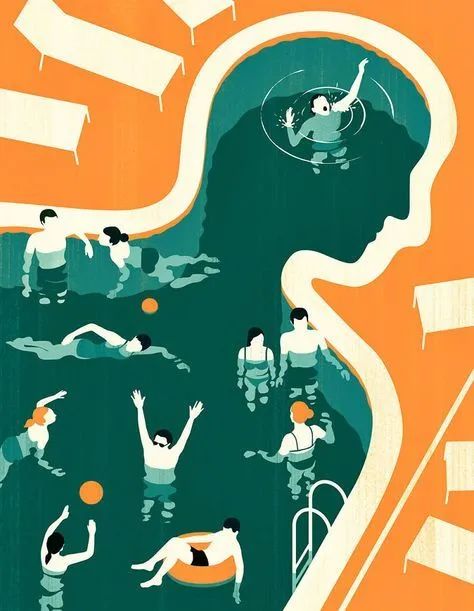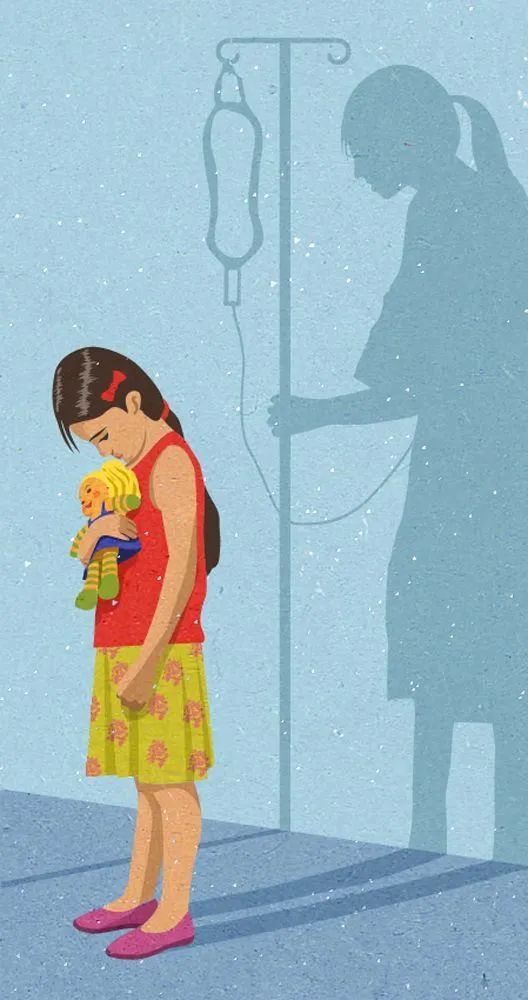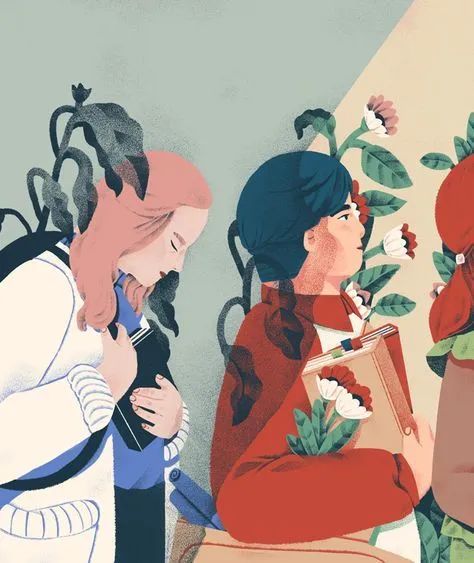“I got into the bed with the growth and told myself I gave up.”
Editor’s note: This article comes from the WeChat public account “Neural reality” (ID: neureality) .
Author | Cheryl Platzman Weinstock
Cover | George Douglas
Translator | Lanchuan Proofreader: Zhang Meng
Typesetting | Mao Yahan

In June 2019, Nicholas Lyons graduated from a private special education high school in Maryland. Like many classmates, he did not know where to go from now on. His mother, Kelly Lyons, was also worried, but she was more worried about her son’s health than future plans-eighteen-year-old Nicholas had experienced depression several times and had planned suicide once.
Nicholas was diagnosed with autism at the age of nine. The misfortune is not alone. The clever but not sociable boy began to receive depression treatment at the age of twelve. “He was teased because he was different. He was smart enough to know this,” his mother said. “This is the real problem.”
At the age of thirteen, Nicholas’ state of mind fell to the bottom. He avoided daily social activities, such as chatting with his family at dinner and playing video games. He also showed common signs of depression and began to become lethargic. Mother Kelly increased the treatment time from once a week to twice a week. But during this period, his social problems continued to increase. “Autism makes me suffer a lot of insults. These insults are very bad. Those children sometimes make me angry, this is sometimes really annoying, and sometimes it makes me very sad.” Nicholas said.

-Joey Guidone-
His mother could not bear such a bad bullying, so he left the public school he attended. Nicholas enrolled in a private special education high school after transfer and has been thriving until he is 17 years old. But then he began to worry about his destination after graduation, and once again fell into the whirlpool of depression, began taking antidepressants prescribed by psychiatrists. These drugs made him feel “smooth and calm”, but the anxiety about the change of life still exists.
A meta-analysis of 66 studies published in January 2019 shows that people like Nicholas who have long struggled with major depression are not uncommon among people with autism spectrum disorders-they have suffered during their lifetime The odds of depression are four times that of ordinary people, and scientists do not know why. This probability will also increase with increasing intelligence and age. Carla A. Mazefsky, associate professor of psychiatry and psychology at the University of Pittsburgh, Pennsylvania, said that in fact, more than 70% of young autistic patients have mental health conditions including depression and anxiety, and they have grown Adult conditions will not improve, and may even worsen.
Many people with autism have terrible endings. Severe depression can severely impair the patient’s independence, endurance, daily life, and social skills. It can also cause greater obstacles to communication that they already find difficult. Depression can also lead to suicidal tendencies, according to Nicholas’s mother, before she transferred her son from public school, he had planned to break himself.
Despite the grim situation, hope is slim. There is no research on which screening method is the most effective, nor does it focus on which treatments can best relieve depression in patients with autism. For example, we have no way of knowing whether depressed autistic patients respond differently to psychotherapy, or how to adjust treatment methods such as cognitive behavioral therapy (CBT) to best suit their needs. Because autistic patients have the characteristics of alexithymia, that is, the recognition of social communication and their own feelings, the problem of conversation therapy is particularly obvious.

In addition, the effect of depression medication on autistic patients is still unclear. Jeremy Veenstra-VanderWeele, a child and adolescent psychiatrist at Columbia University in New York, said: “This (drug therapy for depression) may cause more side effects and adverse reactions.” HeIt is also pointed out that antidepressants may affect the sleep of children with autism and aggravate the obsessive tendency, which may be more harmful than beneficial.
In addition to developing better screening tools and treatments for depressed autistic children, researchers are also trying to explore the root of the problem. The source of the intersection of depression and autism is difficult to trace easily. “Although we know that depression is not uncommon among patients with autism spectrum disorders, in reality we still know very little about the two. The entire research field is developing very slowly.” Vinstra van der Weiler said.
Where does depression come from?
Mental and psychological problems such as depression usually come from the interaction between genes and environment. From this perspective, Lisa Gilotty, an autism expert at the National Institute of Mental Health, said that researchers do not know what role autism plays in such interactions. A 2018 study showed that compared with most people, the healthy siblings of autistic patients have about 40% higher risk of depression, which may indicate the role of genes.
For other patients, especially young people with autism like Nicholas who have little need for support, depression can also result from bullying, isolation, or other social problems. Statistical studies have shown that loneliness is the most accurate sign of depression. “(To avoid depression) It is important to meet your social needs, and autism will block the way,” said Katherine Gotham, a clinical psychologist who led the study.
According to the research results presented at the annual meeting of the International Society for Autism Research (INSAR, May 2019), rumination (repeated reflection of negative events and emotions) may also cause depression in people with autism. Many people with autism have repetitive stereotypes and extremely strong hobbies. When such a focus turns to sad or unpleasant experiences, it will cause harm to their mental health.
Catherine said: “It is not uncommon for people with autism spectrum disorders to suffer trauma or unexpected events, and these can also contribute to their depression.”
She also said that people with autism are particularly prone to addicted to negative emotions. For example, by measuring pupil response, it can be found that adult patients with autism respond to sad expressions faster than neutral expressions.
Autistic adults with depression focus more on angry or sad faces, and generally spend more time looking at sad faces than typical depressed patients and non-depressed individuals. “That is to say, if we can find a way to effectively guide autistic patients not to be immersed in negative information, it can help them build a more adaptive way of thinking.” Catherine said.

-Joey Guidone-
Some of those methods may be the same as those for ordinary people-social support and approved employment programs can prevent ordinary people from suffering from depression and avoid suicidal tendencies. Studies have shown that this is also true of autistic patients.
Good work support saved Sean Boogaard, 47, from Jacksonville, Alabama, from a vicious cycle of depression. Although Bugard was diagnosed with autism only five years ago, according to him, his long-standing communication problems have buried several jobs. “I have a hard time understanding people’s body language, such as judging whether someone is angry,” he said. “What I did is completely correct, but I still receive negative reactions that I cannot understand. I also lost the Second chance. “
Bugad has been married in his thirties for five years. According to him, it was also a period of “serious unemployment”. He tried his best to fight depression, but the situation worsened as the marriage ended. “That was caused by the situation.” He said. After he was diagnosed with autism in 2014, he found a job in the local county town to maintain the network and area of roads that first responders need to cross. His new bosses knew he had autism, so they would be more straightforward when they communicated to him.
“Since they knew I had an autism spectrum disorder, it was much easier to do things here,” Bugard said. If he does something wrong, the boss will explain the situation and guide him how to make up. He said: “For many other places, the company will make a list of your mistakes and sweep you out when the evidence is sufficient, instead of giving you the opportunity to make up.”
The clinical situation is complicated
Similar to Bugard, Becca Lory Hector, a young man in Bailey, Colorado, has gone through multiple jobs without knowing why. Several psychotherapists have diagnosed Hector with schizophrenia and bipolar disorder and given medication, but these medications make her feel worse.
One day in 2009, the 33-year-old Hector decided to quit his job as a bartender and move back to his home in Queens, New York to live with his mother. “I got into the growthQuilt, told myself I gave up. “She said. In the best part of the next three years, she was under cover.” The only reason I didn’t end my life was to worry about the impact my leaving would have on my mother. “She said. In the end, Hector was diagnosed with autism with anxiety and severe depression at the age of 36:” I feel relieved and recognized, this is the first time in more than a decade I feel that the future is promising . “
But many people with autism have not been diagnosed with depression in their lifetime, nor have they been able to get the help they need.
“It is indeed difficult to assess depression for people with autism.” Catherine said. Because depression is a “internalized” mental disorder characterized by internal despair, self-blame, sadness and other emotions, health professionals may not notice it. For autistic patients who are not good at expressing themselves in verbal or non-verbal ways, pointing out internalized mental disorders is particularly challenging.
In addition, depression is an incidental disease. In order to discover it in time, doctors need to cooperate with patients to interrogate and observe subtle changes in their functions, such as changes in sleep patterns, social behavior, and appetite.
Complicating these challenges even more is that certain signs of depression, such as disassociation, may be misunderstood as part of autism. Depression may also show the physical discomfort often associated with autism, such as fatigue, restlessness, stomach pain, etc. Depression can sometimes worsen the features of autism, including aggressiveness, self-harm and self-harm and irritability. The hidden nature of depression and its coincidence with autism make the clinical situation complicated. The diagnosis and identification tool for depression in autistic patients is still in the stage of verifying effectiveness.
At the same time, mental health experts and psychiatrists can benefit from training aimed at helping people with autism. In an unpublished study at the INSAR conference in May 2019, Brenna Maddox, a postdoctoral fellow at the University of Pennsylvania, and his colleagues found that community mental health clinicians treat themselves to adult patients with autism. Ability is not always full of confidence.
Of the 100 clinicians surveyed by the team, 70 have not encountered adult autism patients in their careers, 76 have not received formal relevant training, and most doctors are People show greater confidence. As Maddox said, these doctors “underestimated themselves”.
Sarah Cassidy, an associate professor of psychology at the University of Nottingham in the UK, said that parents and pediatricians can also be guided to pay attention to depression signals in autistic children. Starting in 2018, screening for childhood depression has become a basic standard for junior pediatricians in the United States. Edward Lewis, a pediatrician who has been practicing medicine in Rochester, New York for 38 years, said that because pediatric patients are usually not good at all or cannot express their children at all, heWe should be able to find clues to depression.
Lewis stated that he would obtain auxiliary diagnostic advice from Project TEACH. Through this project, he was able to conduct a telephone consultation with a child psychiatrist at the New York State Office of Mental Health.
Lewis said he learned that depressed autistic children often show a series of warning signs. “Some children with depression will show a little irritability and nervousness, others may become agitated, inattentive or anxious,” he said. “Some patients may be drowsy and listless, And feel sad. This cannot be generalized, but when you look at their faces, you can feel their depression. “

-John Holcroft-
Private treatment
Diagnosis of depression in people with autism is only half the battle. It is not easy to treat this condition, and it will make it difficult for clinicians to choose.
For example, some people with autism, especially children, have a higher risk of side effects when taking antidepressants, including agitation, hyperactivity, and aggressiveness. And there is still a limited number of clinical studies on the efficacy of these drugs in autistic patients with comorbid depression. Vasa) said.
Most doctors switch to adaptive psychotherapy, such as cognitive behavioral therapy that can help patients rebuild harmful ways of thinking. Although there is no data on the effectiveness of CBT on depression in autistic patients, the methods used to treat anxiety in autistic patients have been studied and adapted to different situations, Catherine said. “Unfortunately, we haven’t had a gold standard for treating these (autism) patients,” she added, but she said there is no reason to wait: “I don’t think CBT seems to cause actual harm to depressed patients in this population. . “
Some researchers are exploring ways to improve CBT to treat autistic patients with comorbid depression. Mazewski said that doctors can follow predictable treatment routines and structures toCompetencies and talents are also included, to repeat the concept, and to visualize the abstract concept through visual means and worksheets. They can also focus more on emotion recognition. Mazefsky also found that combining mindfulness training can help people with autism improve their emotional awareness.
In December 2017, a small trial found an improved, guided self-service CBT, ADEPT, which was widely accepted by depression therapists and autism participants. Seventy participants received nine treatments. In this process, the therapist does not lead the treatment, but only encourages the participants to randomly explore the connection between the completed self-service exercises and their own feelings, so that they can make a constructive change in their daily lives. Although the investigators did not assess the effectiveness of this method, the trial also corroborated that the intervention helped improve the mood of the participants.
“It is very important for people with autism to have access to a range of effective treatments and make the most suitable choice for themselves.” Allie, clinical psychologist at the Center for Applied Autism Research, University of Bath, UK, leading the ADEPT trial Alisa Russell said. Guided self-help therapy may help autistic patients overcome some of the difficulties in receiving treatment, including scheduling appointments and going home.
Once an autistic patient begins treatment, it is particularly important to develop a personalized treatment plan based on the specific individual and the particularity of his condition. Hector ’s therapist helped her understand the significance of the diagnosis of autism and the impact of this condition on her life. The therapist then talked about Hector’s depression.

-Jeannie Phan-
As the treatment continues, Hector regains the courage to become a member of the autism spectrum, and has even been ill for a long time. She bought a house and entered the marriage hall in August 2018. “I never thought I would qualify for a loan or be able to leave New York City. This is my dream since the age of sixteen.” Hector said.
Nicholas is also chasing his dream-looking for a job and preparing for college. His mother said that he no longer needed as much care as she used to. She tried to let go a little, but she was still worried when Nicholas needed help.
He is still making progress. In the summer of 2019, Nicholas was treated with CBT under the guidance of a therapist and continued to receive antidepressantstreatment. The medical treatment did not bring him any adverse side effects. “Now I try my best to keep myself alive to avoid losing ground,” he said. “I like to live a full life so that I don’t feel busy. Now, I’m developing a strategy for the future.”
Original:
https://www.spectrumnews.org/features/deep-dive/the-deep-emotional-ties-between-depression-and-autism/